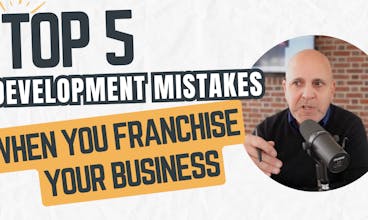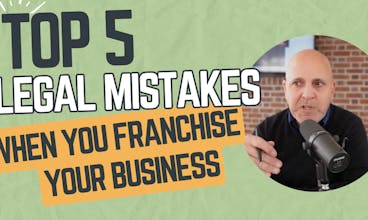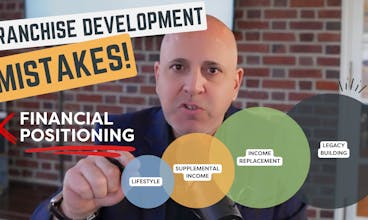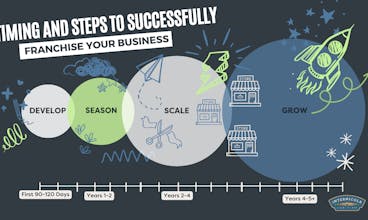What to do Before Franchising Your Business
You're thinking about franchising your business.
Maybe franchising has been a part of your plan since the first day that you opened your business or, maybe its something you've thought about along the way as customers and others ask if you're already a franchise or if they can open a location. Either way, you're interested in franchising your business and whether you’re looking to franchise your business tomorrow or a year from now, there are steps you can take today to prepare for your journey as a franchisor.
If you are interested in franchising your business in the future, follow these steps to prepare your business for franchising:
- Establish and protect your brand
- Build strong unit-level economics
- Create and document your business systems
- Adopt a franchise growth strategy
1. Establish and Protect Your Brand
When you franchise your business, as a franchisor you’ll be granting franchisees a license to use your trademarks, including your business name and logo, in their daily operations – ideally across the nation. Because of that, one of the most important steps you can take when preparing to franchise your business is developing your brand and protecting your trademarks.
Establish your brand identity
How you present your brand to the world means everything when it comes to franchising. As an aspiring franchisor, it’s important that your business name is aligned with your business activities, that your logo is unique, and that your branding is consistent across all customer-facing channels including your website, indoor and outdoor signage, vehicle wraps, advertising materials, social media and more.
Register your trademarks
One of the biggest challenges new franchisors face is having a great business name or logo that isn’t legally protectable. Because your franchisees will be using and operating under your brand and business name in multiple locations, hopefully across the country, it’s important to protect your brand’s identity from being used or stolen by competitors.
You can protect your brand’s identity at the federal level by registering your business name, logo, and other protectable intellectual property with the U.S. Patent and Trademark Office (USPTO). Because the trademark registration process can be complex, it’s a good idea to work with an attorney that has experience with trademark registration to ensure all of the necessary legal steps are followed.
2. Build Strong Unit-Level Economics
Having a track record of financial success is critical for attracting well-qualified franchisee candidates and brokers during the process of selling your first franchise opportunities. Because of that, it’s important to build up strong unit-level economics before franchising your business.
Evaluate gross sales
When preparing to franchise your business, it’s important to pay attention to your business’s gross sales to determine what your future franchisees’ gross sales might look like when they open a new location. Even if you’re not planning on franchising your business today, having this information on hand will likely prove useful during the franchising process later down the road.
Assess franchisee margins and future profitability
In addition to gross sales, evaluating operating costs and future profits can be beneficial while preparing to franchise your business. What are your product, food costs and labor costs? How do those expenses factor into your business model? By taking time to address the fundamental aspects of your business income and expenses, you can determine what franchisee operating costs and profit margins might look like in the future.
Dive into your business metrics
While gross sales, operating margins and future profitability are important factors for every business owner to pay attention to, it’s also critical for prospective franchisors to evaluate their existing business’s metrics. By assessing the percentage of clientele that are repeat customers and tracking data about average sales per customer, balance between sales, etc., you can better position your business for profitability and future franchising success.
3. Create and Document Your Business Systems
Franchise success requires efficient and documented business systems that can be taught to franchisees. Uniformity and consistency is key and, as a business owner preparing to franchise your business, its important to consistently improve and document your business systems.
Develop an operations manual
Your franchise operations manual will serve as the blueprint and how-to guide for franchisees across your future franchise system. Because of that, it’s important to start working on your operations manual as early as possible. As a critical document in the franchising process, the manual should include information about your business including but not limited to daily operating procedures, systems, suppliers, marketing plans, corporate contacts and more. During this process, it’s also a smart idea to focus on improving efficiency in your daily operations.
By preparing an operations manual before franchising, you can simplify the process of onboarding new franchisees in the future by establishing consistent, systemwide standards of operation. As your franchise system grows, your operations manual should be updated to meet the changing needs of your business.
4. Adopt a Franchise Growth Strategy
Franchising success doesn’t happen overnight. Often, it can take years for new and emerging franchisors to achieve sustained growth and profitability. As an aspiring franchisor, your vision as a founder should be centered on growing an organization over time.
By creating a five-year success plan when preparing to franchise your business, you can stay on the right track over the long term while remaining true to your vision as a founder. By focusing on organic growth and over-supporting your first few franchisees during your first few years in business, you can set your franchisees – and your franchise system – up for lasting success.
It’s important to remember that franchising your business isn’t about short-term wins – it’s about growing a sustainable organization over the long term. By taking the right steps now as you prepare to franchise your business, you can build a thriving franchise system that will stand the test of time.
Summary
By legally protecting your brand, building strong unit-level economics, establishing good operations systems and focusing on your vision as a founder, you can set your business up for success even before selling your first franchise. After your Franchise Disclosure Document (FDD) is issued, you’ll be ready to hit the ground running as a new franchisor with a track record of success – something that can help establish trust with franchise brokers and attract well-qualified prospective buyers later down the road.
Below, we’ll explore best practices for preparing to turn your business into a franchise as an aspiring franchisor.
By legally protecting your brand, building strong unit-level economics, establishing good operations systems and focusing on your vision as a founder, you can set your business up for success even before selling your first franchise. After your Franchise Disclosure Document (FDD) is issued, you’ll be ready to hit the ground running as a new franchisor with a track record of success – something that can help establish trust with franchise brokers and attract well-qualified prospective buyers later down the road.








